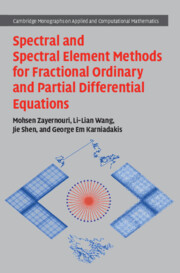
- Publisher:
- Cambridge University Press
- Online publication date:
- October 2024
- Print publication year:
- 2024
- Online ISBN:
- 9781108867160

This comprehensive introduction to global spectral methods for fractional differential equations from leaders of this emerging field is designed to be accessible to graduate students and researchers across math, science, and engineering. The book begins by covering the foundational fractional calculus concepts needed to understand and model anomalous transport phenomena. The authors proceed to introduce a series of new spectral theories and new families of orthogonal and log orthogonal functions, then present corresponding spectral and spectral element methods for fractional differential equations. The book also covers the fractional Laplacian in unbounded and bounded domains and major developments in time-integration of fractional models. It ends by sampling the wide variety of real-world applications of fractional modeling, including concentration transport in surface/subsurface dynamics, complex rheology and material damage, and fluid turbulence and geostrophic transport.
‘This interesting book provides an excellent and comprehensive presentation of recent major developments in nonlocal spectral theories and high-order numerical methods for fractional models. This monograph has been pedagogically made accessible for a wide spectrum of readers from mathematical/natural sciences and engineering communities, highlighting diverse applications such as surface/sub-surface anomalous transport, power-law rheology, multi-scale material failure, and fluid/scalar turbulence.’
Francesco Mainardi - Retired Professor of Mathematical Physics, University of Bologna, Italy
‘Written by four known specialists in numerical methods, this book covers a wide spectrum of advanced numerical methods suitable for fractional-order modelling of real processes, such as anomalous heat and mass transfer, rheology, and other complex phenomena. The style and the rigour of presentation makes this book a good source for researchers who need to apply such methods in various fields of science and engineering.’
Igor Podlubny - Technical University of Kosice, Slovakia
 Loading metrics...
Loading metrics...
* Views captured on Cambridge Core between #date#. This data will be updated every 24 hours.
Usage data cannot currently be displayed.